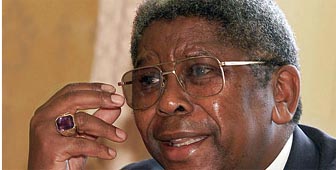South African archbishop calls for compensation from banks

Archbishop Niongonkulu Ndungane, the successor of Desmond Tutu as head of the Anglican Church in South Africa, has called on Swiss banks to pay compensation for the support they gave the South African apartheid-era government.
Ndungane is on a three-day visit to Switzerland and he is urging debt relief for South Africa and for so-called reparation payments. These payments, according to the campaign, should be compensation for the support Swiss banks gave the South African government during the apartheid era when most other governmetns had introduced economic sanctions against Pretoria.
On Tuesday, Ndungane met Swiss foreign minister Joseph Deiss in what a ministry spokesman described as a “courtesy visit”.
When Nelson Mandela’s government came to power six years ago, it inherited a foreign debt burden of SFr40 billion according to the South African Jubilee 2000 Debt Cancellation Campaign. Since this money was used to prop up an undemocratic regime, the campaign argues, those debts should now be cancelled, or the profits thereof paid back.
The Swiss branch of the campaign, a group of development NGO’s and church organizations, have targeted Swiss banks with the demand for such payments, which they call reparations. According to a campaign leaflet produced to coincide with Archbishop Ndungane’s visit, Swiss banks are said to have made profits of SFr500 million with credits lent to the apartheid government from 1985 to 1993.
“Some Swiss banks bailed out the apartheid regime when it was on the verge of bankruptcy”, Ndungane said in an interview with swissinfo. “There is an expectation that the banks make a contribution towards restoration and healing.”
The payments should help the present government in Pretoria to bolster their development budget, which is hampered by interest payments. More specifically, so-called reparation payments could be used to further the process of reconciliation in the context of South Africa’s Truth and Reconciliation Commission (TRC).
Ndungane said the Swiss government should put pressure on enterprises and financial institutions to contribute financially to TRC reparations. “Within the TRC process, the perpetrators of apartheid crimes receive amnesty, but the victims do not get the reparations they were promised”, Ndungane said.
The issue could become a threat to reconciliation, Ndungane warned and said that Switzerland, which has co-financed the TRC, should “go an extra mile.”
A spokesman for UBS, the largest of the banks who had important business relations with South Africa, would not comment on Ndungane’s visit but stressed that no demands for the payment of so-called reparation money had been made by the South African government.
Indeed, when Swiss foreign minister Deiss visited South Africa last year, he broached the issue in his talks with foreign minister Dhlamini-Zuma, but was told that reparations were a non-issue with the government in Petoria.
by Markus Haefliger

In compliance with the JTI standards
More: SWI swissinfo.ch certified by the Journalism Trust Initiative
You can find an overview of ongoing debates with our journalists here. Please join us!
If you want to start a conversation about a topic raised in this article or want to report factual errors, email us at english@swissinfo.ch.